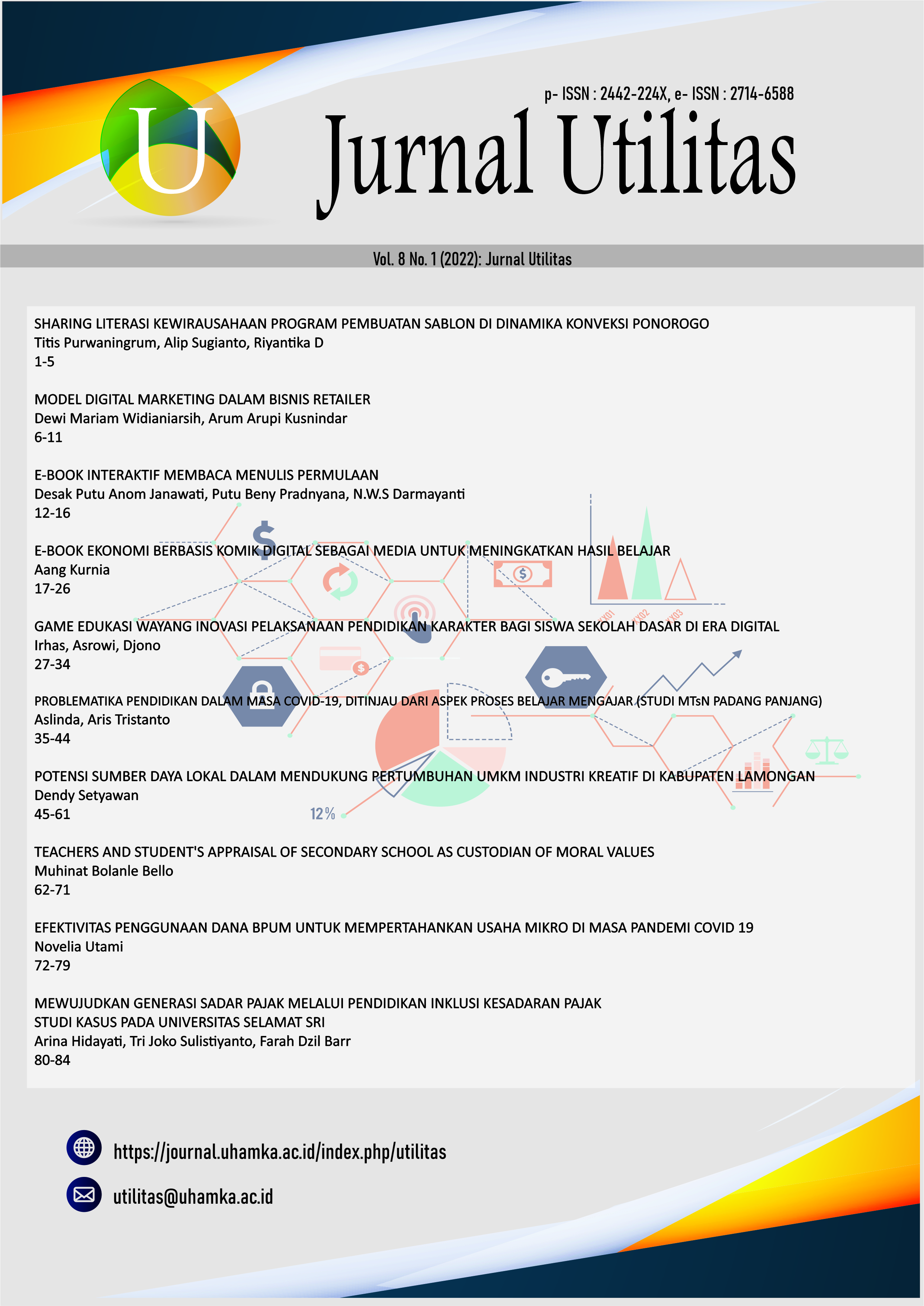EFEKTIVITAS PENGGUNAAN DANA BPUM UNTUK MEMPERTAHANKAN USAHA MIKRO DI MASA PANDEMI COVID 19
DOI:
https://doi.org/10.22236/utilitas.v8i1.8624Abstrak
The government continues to strive so that the community's economy can survive during the pandemic, one of which is the Micro Business Productive Presidential Assistance (BPUM) program for micro-businesses, therefore this study aims to find out how effective the use of BPUM funds is in maintaining micro businesses in the midst of the covid 19 pandemic, especially the micro-enterprises that were fostered by the leadership of the branch of Aisyiyah Kp Rambutan, East Jakarta. This research uses descriptive quantitative method with a saturated sample of 13 micro businesses. Data collection techniques through field observations, questionnaires, interviews and documentation, followed by statistical test calculations using SPSS. The results obtained are that the timeliness of BPUM receipts is 75%, the accuracy of cost calculations is 76%, the accuracy of making choices is 79% and the accuracy of targets is 70%. It can be seen that the use of Banpres funds is considered quite effective in maintaining micro-enterprises and can even increase business profits by 20%-25% if averaged. Thus, the sustainability of this program needs to be considered to continue to support micro-enterprises in increasing their business.
Unduhan
Referensi
Azzahra, F. (2020). Menakar Efektivitas BLT UMKM di Masa Pandemi Covid 19. Yoursay.Id.
Dzakiyati, F., Kismartini, & Astuti, R. S. (2021). Implementation of Assistance Program For Micro Enterprises (BPUM) in Central Java. Jurnal Ilmiah Ilmu Administrasi Publik, 11(1), 208. https://doi.org/10.26858/jiap.v11i1.21010
Humas. (2020). Kebijakan Pemulihan Ekonomi di Masa Pandemi Berhasil Tingkatkan Penyaluran KUR Bulan Juni. Sekretariat Kabinet Republik Indonesia.
Humas Kementerian Koperasi dan UKM. (2020). Penjelasan Pelaksanaan Penyaluran BanPres Produktif Usaha Mikro. Https://Kemenkopukm.Go.Id/.
Kurniawan, A. (2005). Transformasi Pelayanan Publik. Pembaruan.
Lumempow, K. M., Sambiran, S., & Rachman, I. (2021). Implementasi Kebijakan Pemerintah Dalam Pengembangan UKM Pada Era Pandemi Covid-19 di Kecamatan Kawangkoan Barat Kabupaten Minahasa. Disiplin Pegawai Dalam Meningkatkan Kualitas Pelayanan Publik Di Kantor Kecamatan Tikala, 1(1), 1–8.
Machmudi, M. I. Al. (2020, September).
Survey BPS, Mayoritas Pendapatan UMKM Anjlok akibat Pandemi. Media Indonesia.
Makmur. (2010). Efektivitas Kebijakan Kelembagaan Pengawasan. Refika Aditama.
Malini, K. T. W., & Herawati, N. T. (2021). Pengaruh Efektivitas Penggunaan Dana BPUM, Penggunaan Software Akuntansi, dan Human Capital Terhadap Kinerja Usaha Mikro (Studi Pada Usaha Mikro Penerima Dana BPUM di Kecamatan Buleleng). Jurnal Akuntansi Profesi, 12(1), 97. https://doi.org/10.23887/jap.v12i1.34606
Rohman, L. L., & Andadari, R. K. (2021). Dampak Pandemi COVID-19 pada Usaha Rumah Tangga dan Strategi Bertahan Pendahuluan Metode. Jurnal Penelitian Dan ..., 5(April), 82–90.
Siagian, S. P. (2001). Kiat Meningkatkan Produktifitas Kerja. Rineka Cipta.
Suci, Y. R. (2017). Perkembangan UMKM (Usaha Mikro Kecil Menengah) di Indonesia. Jurnal Ilmiah Fakultasi Ekonomi, 6(1), 51–58.
Sugiyono. (2016). Metode Penelitan Kuantitatif, kualitatif dan R&D. In Bandung: Alfabeta.
Supriyanto. (2012). Pemberdayaan Usaha Mikro, Kecil dan Menengah (UMKM) Sebagai Salah Satu Upaya Penanggulangan Kemiskinan. Jurnal Ekonomi Dan Pendidikan, 3(1), 1–16. https://doi.org/10.21831/jep.v3i1.627










